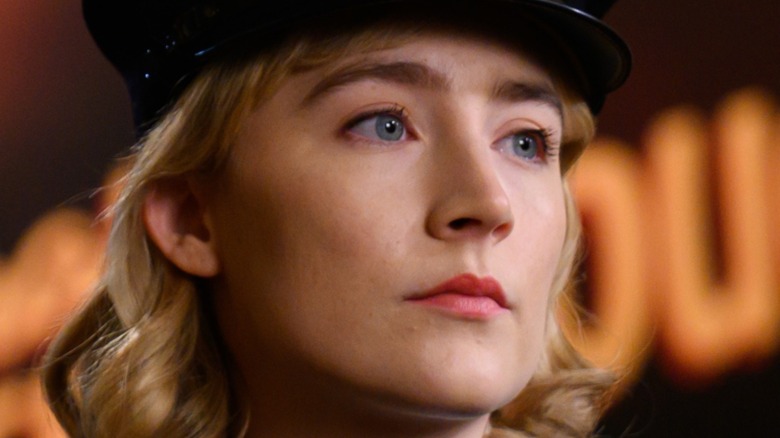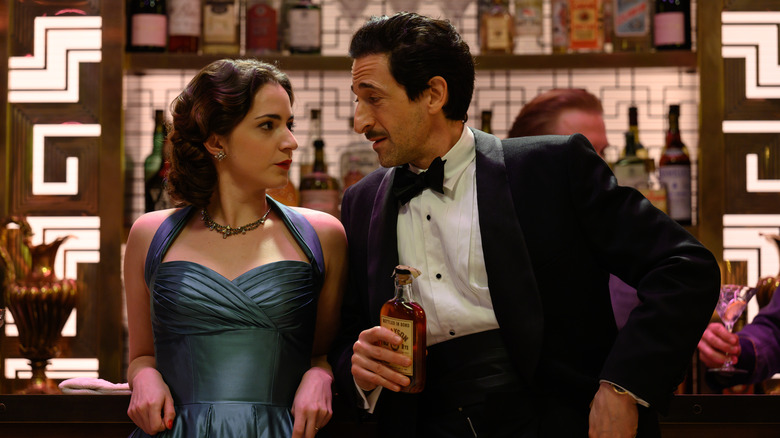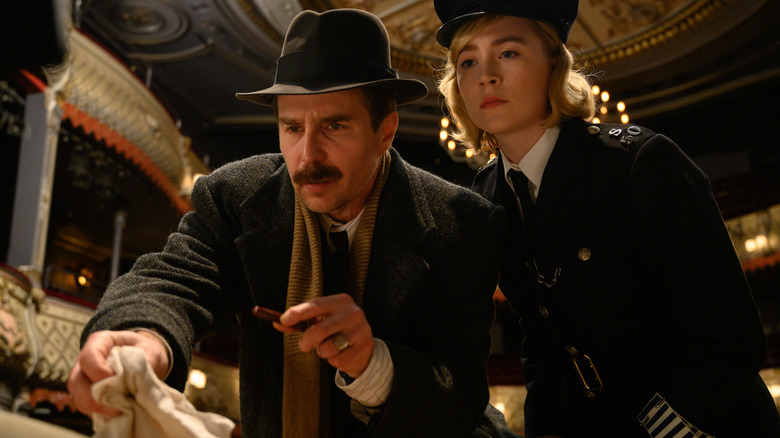See How They Run Review: Meta Noir
- Deconstructs the whodunit genre without getting too self indulgent
- Really sharp work from the cast
- Paced strangely for such a short movie
In the film's opening monologue, jaded filmmaker Leo Köpernick (Adrien Brody) discusses the repetitive nature of the "whodunit" genre, and "See How They Run" thus seemingly damns itself with a self-fulfilling prophecy masquerading as pithy cinematic commentary. "Seen one? Seen 'em all." Leo runs down the basic structure of every whodunit ever made for the stage, the page, or the screen — a structure the film begins to follow almost mockingly. But "See How They Run" isn't interested in proving Leo wrong. Not exactly. No, Mark Chappell's script, and BBC drama veteran Tom George's charming staging of it, luxuriate in the well-worn tropes of the genre, thumbing its well-frayed edges with a loving sincerity.
This isn't a film that wants to send up a particular brand of mystery yarn, but rather an ornately arranged exploration of why it grips audiences decade in and decade out. George and Chappell set two warring perspectives on the solving of a crime against one another, playing up the fantastical, neat, and tidy nature of fiction by crashing it into the mundane and maudlin tones of real life.
The result is a film that has its cake and eats it, too, turning the metatextual exploration of the genre into a confectionary Ouroboros.
Some spoilers ahead for "See How They Run"...
The play is the thing
Leo Köpernick opens the film with that snarky monologue because he's hiding out from Joseph McCarthy and the black list in the U.K., where he's been hired to make a movie adaptation of Agatha Christie's "The Mousetrap," a wildly successful whodunit for the stage that has been running for 100 shows. His rapacious nature has already rubbed wrong his producer John Woolf (Reece Shearsmith), his screenwriter Mervyn Cocker-Norris (David Oyelowo), and his star Richard Attenborough (Harris Dickinson). So it shouldn't be a shock when he turns up dead on stage — his loose tongue ripped from inside his mouth — because, after all, the victim is always whoever has the most potentially murderous enemies.
Enter Inspector Stoppard (Sam Rockwell), a disheveled detective tasked with catching the killer without interrupting the lucrative run of the play and enraging his superiors' friends. Stoppard is paired off with the inexperienced but dedicated Constable Stalker (Saoirse Ronan), a starstruck rookie who loves movies and can't stop seeing the investigation through the rules and tropes of the whodunit. Stoppard, by comparison, is laconic to the point of looking like an errant sleepwalker, a perpetually soused man grumbling through life with broad questions and no implied deeper analysis. He's nothing like the gumshoes Stalker has such an affinity for on the stage and the big screen.
Above all else, Stoppard impresses upon Stalker the importance of not jumping to conclusions, of not assuming the easiest interpretations of available data simply because it feels narratively cogent given her jaundiced understanding of crime solving. But that becomes harder for her to do the deeper they get into interrogating suspects and the more she finds out about Stoppard's own past and how it may connect with the victim's.
There are plenty of plausible suspects from within the production, as each testimony proves that Leo had some kind of beef with almost everyone he came into contact with. But Stoppard is largely dismissive of each potential resolution to the case, struggling as he is to stay upright most of the time. The glamor and the charm and the procedural element of the whodunit become frustratingly stunted as the viewer must contend with a real-life murder living in the shadow of a fun, fake one.
The tension between expectations and reality makes Stoppard a strangely compelling figure. A movie this obsessed with the way whodunits function means that every time Stoppard seems checked out, or too grizzled to truly care, we the viewer feel like we're just a scene or two away from him Poirot-ing out of his somnambulant spell to spring into action and set everything straight. But what if he can't?
Get a clue
Sam Rockwell's performance as Stoppard leaves a bit to desire, even if his haphazard dedication to an English accent and general curmudgeonry does fit the part. But it's Saoirse Ronan's Stalker who feels like the real protagonist of the film. Throughout the plot's many machinations, it's her we watch become shaped by each new revelation. She's the one with the most to learn about this crazy, mixed-up world, so getting to see her acclimate to the harsh realities operating at the edges of the spectacle she loves so much proves moving at every turn. Rockwell and Ronan's buddy chemistry takes some time to develop, but once they start to gel, there's something special at play.
But as much as "See How They Run" is a movie that leverages how the real world works against how fiction does, it's not entirely a verité affair. Rockwell is playing a character named after "The Real Inspector Hound" scribe Tom Stoppard, another exploration of the whodunit that plays with similar ideas. Where Rian Johnson's "Knives Out" franchise seeks to modernize the mystery genre for new audiences, and Shane Black's work on "Kiss Kiss Bang Bang" and "The Nice Guys" mined comedy from bucking well-trodden tropes in unexpected ways, "See How They Run" does both, only it injects its period piece setting with a healthy dose of modernity.
Having real-life figures like Woolf, Attenborough, and even Agatha Christie herself appear throughout lends proceedings a necessary hint of gravitas, of feeling tethered to the world we inhabit and not the one we watch to escape. But perhaps the movie "See How They Run" borrows from the most liberally is actually Spike Jonze's "Adaptation," another film that seemingly flouts every bit of Hollywood convention throughout, only for it to ultimately succumb to the same form of unreality it has so savagely taken to task. Anyone who has seen that Charlie Kaufman-penned classic will immediately recognize a scene where Leo, in flashback, pitches his ending to the film version of "The Mousetrap," one that sounds entirely too fantastical and high octane both for the 1950s and also such a stuffy, staid genre.
So, when the film ends up moving in a direction that would make the deceased director smile, it feels both like an ironic bit of comeuppance at the play that caused his downfall and also proof that Leo was wrong in his opening diatribe. "See How They Run" is just like every other whodunit... until it isn't.
"See How They Run" dashes into theaters on Friday, September 16.


